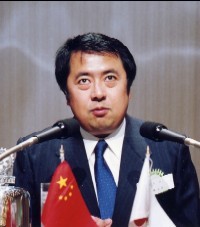The 401 year history of the stage name Ebizo to which an actor has just succeeded ˇˇ
August 4th,2004
Kabuki critic
ˇˇMr.Osamu Inumaru
 ˇˇA succession performance by the 11th generation Ebizo Ichikawa took place in Osaka last month following the same in Tokyo. The theater was filled, and in my 30 year experience of attending Kabuki performance have never seen any actor so popular.
ˇˇA succession performance by the 11th generation Ebizo Ichikawa took place in Osaka last month following the same in Tokyo. The theater was filled, and in my 30 year experience of attending Kabuki performance have never seen any actor so popular.
ˇˇEbizo will do the same in Nagoya, and Paris in October. He will be the first Kabuki actor to stage a succession performance anywhere overseas.
ˇˇIn December he will perform in Kyoto, and next June in Fukuoka, so he will be making repeats for a year.
ˇˇOnce you step into the Kabuki Theater, you are away from the noise of modern Ginza, and step into the Edo era (1604-1867). The 11ht generation Ebizo is a young man of 26 years of age.
ˇˇThe reason I mentioned 401 years of history lies in the fact that it has been 400 years since the Shogun opened his capital in Edo, with Kabuki performances being started at the same time. The persons who were involved with Kabuki then were all outsiders and outcasts, and Kabuki was unfairly suppressed.
ˇˇHowever, Kabuki was the peopleˇÇs entertainment and greatest media. By absorbing grass root energy, Kabuki flourished.
ˇˇThe art of succession is known only in Japan. By succeeding to the name, the actor must carry on the traditions of the past 10 generations have created. By succession, there is also a meaning of renewal, to be reborn while carrying on tradition. But what is he succeeding to? The Ichikawa family is one of the founding fathers of Kabuki. The founder Ichikawa was a samurai, and made a name for himself as a chivalrous person. His eldest son was called Danjuro who became an actor. He painted his body red, and performed in the manner of Superman, becoming a stage hero.
ˇˇDanjuro worshipped at Narita Temple, and on stage performed in roles in which he was the divinity. He received large sums of money from his fans, which he donated to the Temple, finally taking the name Narita to use as his stage family name.
ˇˇHe seems to have been a rather rough character, and was stabbed to death while on stage in 1704. His son, who was 17, succeeded him and he became so popular he was called the god of the stage. Although hitherto, Kabuki in Edo became popular due to its action plays, he incorporated the more emotional staging which derived from Kyoto, making Kabuki more realistic.
ˇˇThere is an episode illustrating the charisma that the second generation possessed. He was asked to help a young girl who had a high fever. Danjuro ¶ awakened the girl and struck the pose of frightening Buddhist divinity and glared at the sick girl at which the girl recovered from her fever and the ˇĆDanjuro glareˇÇ became well known.
ˇˇEven today, at the succession performance he will say, I will now show you my glare, and glare at the audience, which supposedly drives away evil spirits. Only members of the Ichikawa family have license to do this.
ˇˇHitherto, Kabuki has been mainly a matter of carrying on traditions, and so in a way they were tied to the past.
But being born into the family and being younger, Ebizo is not bound by tradition. He will interpret anew classic Kabuki plays, and he has the ability to create roles.
ˇˇAlthough he is ready to destroy hidebound practices, he does not tend to be eccentric or erratic and is faithful to the play.
ˇˇHis appearance will change Kabuki from performances not for only the few, but as a modern drama which can be appreciated by all.